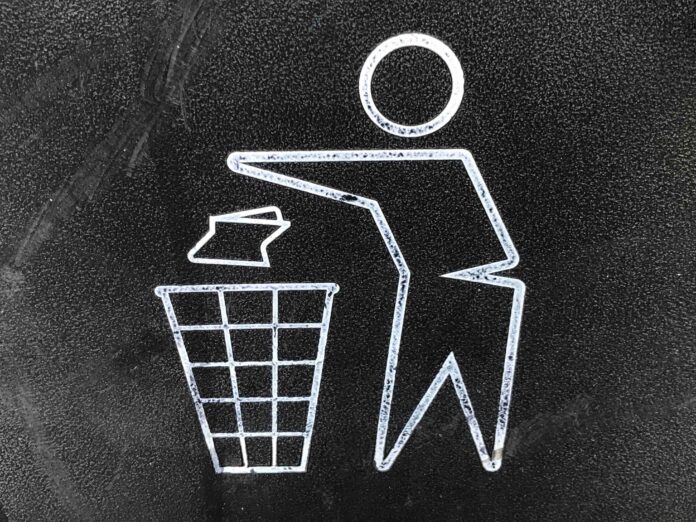“Litter in Fort Worth is quite frustrating right now. I feel like there’s more litter than I’ve ever seen in the city,” said Stelljes, who sits on the board for Keep Fort Worth Beautiful, which leads cleanup and litter education. “But the city has really ambitious and good plans for helping with the Trinity River.”
After years of participating in regional education campaigns and supporting neighborhood cleanups, Fort Worth is revamping its litter prevention programs to collect more data on the issue and encourage businesses to make daily litter sweeps.
Last month, Fort Worth kicked off the effort with an online survey to learn more about where litter is most prevalent and how residents would like to see government agencies tackle the problem
“Everybody cares about litter in the city – I have the voicemails to prove it,” said Avery Pesek, a coordinator for Keep Fort Worth Beautiful. “We spend lots of time tackling litter as a city and certainly in our program. What we’re really wanting is that community feedback on litter and where they’re seeing those impacts.
While the Tarrant Regional Water District has sent out intermittent surveys to community members as part of its “Reverse Litter” campaign, this is the first time Fort Worth has led an independent survey, said Cody Whittenburg, the city’s assistant code compliance director who oversees environmental and health services.
The survey will help spark a community conversation about how residents, businesses and the city can work together to reduce the amount of trash in streets, waterways and parks, he said.
“We understand that people don’t want to see litter, but it’s so beneficial that we have actual data rather than just saying, ‘Oh, the community wants this regarding litter’ based on emails or individual communications,” Whittenburg said. “Then hopefully, over the years to come, we’re able to tell a story of how we’ve been able to make an impact in this space.”
Using the MyFW app and other online tools, more residents are reporting litter when they see it, said Oneil Johnson, Jr., a district superintendent who oversees solid waste for the code compliance department. Litter abatement crews are working hard to address requests from residents within 72 hours of receiving a complaint, he said.
“We don’t want to operate just on requests,” Johnson added. “We want to be proactive, and identifying areas of concern to residents will help us out in not operating reactively, so we can ultimately reduce litter throughout the city.”
Under the city’s new Green Business Partner Program, companies can take their own proactive steps to control litter on their properties, in addition to adopting commercial recycling programs and improving energy efficiency.
Fort Worth’s water department has long recognized companies for water conservation efforts. Whittenburg envisions awards for local businesses who commit to controlling litter sources on their properties through simple actions, such as ensuring trash can and dumpster lids remain closed.
Beyond the initial little commitment, green business partners can adopt other pledges to reduce energy consumption, use compostable packaging or encourage employees to recycle, he said.
“One of our goals is to really work smarter, not harder, by bringing all of these ideas together,” Whittenburg said. “Some places may want to put more emphasis on recycling, while others may want to put more emphasis on energy efficiency and energy management. The list goes on and on.”
Some community members have advocated for ordinances requiring better energy efficiency standards or banning single-use plastic products, Whittenburg said. Fort Worth could potentially adopt ordinances regarding litter control on properties, he added, but the green business program is meant to reward companies for good behavior rather than penalize them for poor cleanup practices.
Most of all, Fort Worth’s code compliance department wants to fight the apathy, or indifference, that comes with a pervasive, citywide problem like litter.
City officials have to take a multi-pronged approach, including educational programs and the use of new technology, Whittenburg said. Fort Worth is in the process of funding two solar-powered “trash wheels” that will filter tons of floatable trash out of the Trinity River.
Community members can do their part by reporting illegal dumping and other issues to city staff, as well as picking up trash when they can, Whittenburg said.
“Trying to overcome that apathy is critical,” he said. “If people think that if they report it, no one’s going to do anything about it. We want to make sure they don’t feel that way. It’s important to reframe this issue for a moment and say: ‘Yes, while there is a lot of litter in the community, it is something that we can overcome if we work together.’ It’s not going to be easy, but we can find a way to do it.”
Haley Samsel is the environmental reporter for the Fort Worth Report. Her position is supported by a grant from the Marilyn Brachman Hoffman Foundation.
At the Fort Worth Report, news decisions are made independently of our board members and financial supporters. Read more about our editorial independence policy here.








